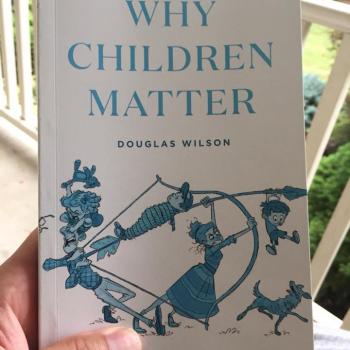 Generally speaking, evangelicals believe you can separate form from content. You can take meaning—what I mean by content—and place it in just about any container without losing something. John 3:16 works just as well scribbled on a beach-ball surrounded by lotioned bodies, as it does when it is printed in a book surrounded by the rest of John’s gospel. Beach-balls have nothing to say as beach-balls, they’re neutral and meaningless, like the rest of the world. So, beach-ball or book, what does it matter?
Generally speaking, evangelicals believe you can separate form from content. You can take meaning—what I mean by content—and place it in just about any container without losing something. John 3:16 works just as well scribbled on a beach-ball surrounded by lotioned bodies, as it does when it is printed in a book surrounded by the rest of John’s gospel. Beach-balls have nothing to say as beach-balls, they’re neutral and meaningless, like the rest of the world. So, beach-ball or book, what does it matter?
This is a very modern way of seeing things, by the way. Which shows, contrary to popular opinion, evangelicals are as modern as everybody else.
This has been the secret to evangelicalism’s success. Since most evangelicals share the operating assumptions about the nature of reality with other modern people, conversion is just a matter of adding value to modern life. And the value added is Jesus, of course.
For most evangelicals Jesus does not define reality, he makes it better. He can relieve you of your guilty-feelings (if you’re still hung-up on those), or he can get you off drugs. He might even help you get along better with your spouse. If you add Jesus to your life you can have your best life now. Jesus sells.
What has helped this along tremendously is evangelicalism’s tendency to downplay “externals”. Externals used to refer to liturgical forms: sacraments, formal prayers, even church attendance. These don’t count in evangelicalism’s low-church ecclesiology. What matters is the heart—spontaneity, authenticity, and emotion. A clumsy prayer, sincerely felt, is better than a rote prayer without true faith.
But what this fails to account for is the possibility of meaning what you say when you read a formal prayer. And it doesn’t account for another possibility: you can actually acquire meaning through something like a formal prayer. Taking this into account means that what matters most is not whether or not you’re “feeling it”—but whether or not the prayer is true.
I’ve heard this referred to as “the problem of wineskins”, referring to Jesus’ analogy in Matthew 9:14-17. But many evangelicals get the problem completely backward. (I know I did.) Jesus’ image of new wine bursting old wineskins actually stresses the truth that there is a necessary connection between form and content.
I think this way of understanding evangelicals helps us spy in the distance where avant guarde evangelicals will find themselves eventually. What follows is a brief description of the road these people are taking viewed from three perspectives. Many of the evangelicals I know have already gone a long way down this road. (I journeyed the road myself before I turned back. A little more about that in a moment.)
What separating form from content has meant for evangelicals and ethics.
Separating form from content has allowed us to separate liturgy from ethics. This is so pervasive now we read it back into premodern life. For instance, some people now categorize Old Testament Law as either ceremonial or moral. But Israelites believed that they were inseparable. There was a connection between sacrifice and honoring God, for instance, there was even a connection between sacrifice and honoring your parents. (If the first seems understandable but the second doesn’t follow for you, then you’re well on your way to losing your understanding of even the first.)
The Apostles did not say sacrifices are meaningless, therefore we no longer perform them. They said Jesus is the better sacrifice, the very sacrifice that all the other sacrifices were leading up to, therefore we no longer need to keep making them.
A subtle shift has occurred for evangelicals here. Can you see it? For most of them the stress is now on the intentions of the worshipper, not on the meaning of what is being done. You can sum it up with that little ditty, “It’s not the gift that matters, it’s the thought that counts.”
What difference does it make? Well, we no longer attend to the meaning of things, we look at the heart—to good intentions—and stop there.
Seeing the chaos that separating form and content could usher into the world the Utilitarians were inspired to draw up the doctrine of consent. When it comes to sex, for instance, we need consenting adults to go along with what we intend to do to their bodies. Yet even this is breaking down. Take the quandary of pedophilia. We do all sorts of things to children without their consent. What makes sex different if our bodies are meaningless and neutral? Some pedophiles even tell us that they were introduced to pedophilia as children, and they’re glad they were!
More on what separating form and content means for our bodies.
One of the indicators that things have gone further than intended is the wide-spread practice of cremating the dead among evangelicals. You even see it among the clergy who ought to know better.
If our bodies are meaningless bags why not burn them when they die? After all, the spirit is where our intentions lie. Remove the spirit and the body becomes just another inanimate thing. Sometimes this is justified by the cost of burial, the truly hip can even appeal to the welfare of the environment. But what would Jesus do?
Isn’t it curious that WWJD ends at death as a guide for many evangelicals? Jesus intended for his body to be buried, that’s pretty clear. Although I wouldn’t put it past some people to claim that if Jesus could only have seen how environmentally insensitive this is he would have had his followers cremate him. (I’m only half joking.)
Getting back to sex, you can probably see where this has led. It is getting more and more difficult for many evangelicals to hold onto the traditional Christian sexual ethic. Because our bodies are neutral, love is love, right? And male and female are no longer even biological givens. And procreation is just another lifestyle choice—not a calling implicit in the nature of things.
What separating form and content has meant for family life.
One thing has a way of leading to another. The reason is due to the fact that the world is not divided into discrete parts in the way that modern people assume. Things lead to other things because things really are connected.
The Apostle Paul revealed some of those connections in Ephesians. The connections are not made by us in our hearts, Paul implies. They exist in fact. There is a connection between the resurrection of Jesus’ body and the meaning of our bodies. And mysteriously, there is also a connection between male and female bodies in conjugal marriage and the union of Christ and the church.
Naturally this means there is such a thing as Christian family life. Therefore the Christian faith cannot embrace all the new domestic living arrangements people are experimenting with these days. Some of these things are simply perverse. We must separate traditional Christian practice precisely because we cannot separate form from content. They go together. And this is one of the reasons why Christians must separate themselves from the world.
My Red-Pill Moment
I was living in Cambridge Massachusetts when these things initially occurred to me over twenty-five years ago.
I enjoyed my years there—I lived and worked there for about a decade. If someone today offered me a job there, I’d be tempted to go back.
I was surrounded by smart people. The cultural scene, the books, the art, the schools, all of it was marvelously stimulating. I met many people who viewed the world very differently than I do. And I enjoyed that. Among other things, these people challenged me to refine my thinking.
Before that I had been led to believe by missiologists and church growth gurus that what people needed was the good news about a personal relationship with Jesus. People didn’t know what they were missing because they had rejected the traditional packaging. They’d thrown the proverbial baby of content out with the proverbial bathwater of tradition. What they needed was better packaging. (In part, this is known as “contextualization” in the parlance of the missiologists). But this premise proved to be mistaken.
Many of the people I came across knew the Bible, Christian doctrine, and even the history of the faith better than many of the people I knew who had a personal relationship with Jesus.
Their rejection of the faith had nothing to do with liturgy. (Some of them actually preferred older forms when it came to that.) What they didn’t want was Jesus. They wouldn’t even take him with the old sexual ethic out of the picture. It turned out that they knew it all went together. They knew you couldn’t have Jesus without a lot of other stuff.
What I learned in those days is I’m not “selling” Jesus—at least not in the sense that most modern people tend to think. What I am selling is Reality. And here’s where the Lord Jesus Christ comes in: he is the revelation of Reality.
Evangelicalism and Gnosticism Lite
Gnosticism is slippery and many evangelicals have slipped into it. After all, it is a very short distance from “creation says nothing but it is good” when creation pleases you, to “creation says nothing and is bad” when it does not. What kept evangelicals from it in the past was biblical literalism and a lower-middle class common sense moralism. But this is changing.
Today some evangelical pragmatists are willing to go where no evangelical has gone before. With education has come a casuistry that is almost Jesuitical. They can turn things upside down, or inside out, with real flair.
The problem, naturally, is the external world has been created by God and is sustained by his power. And he uses that world to communicate with us. It is in the nature of things for them to speak to us. And when Jesus said, “When you have seen me, you have seen the father” he in effect said “the externals you can see help you see the content that you cannot see.”
Until evangelicals see this—their pragmatism will only make their Christianity less Christian by the day.












